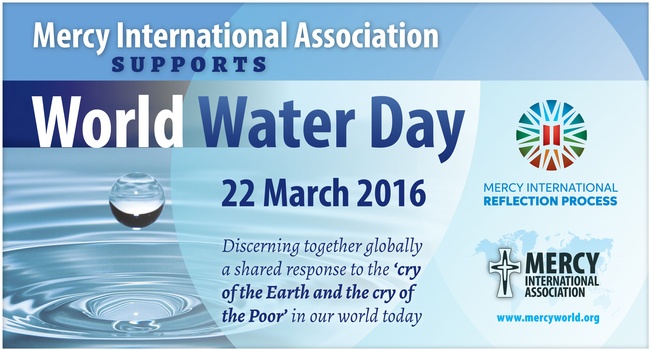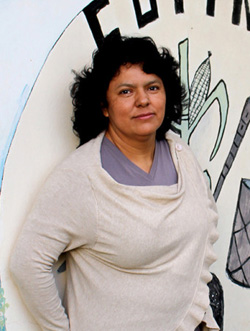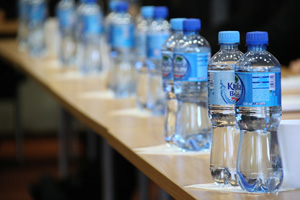September 24, 2018
Mercy Day
A section from the poem, the Rime of the Ancient Mariner, by Coleridge, which my father loved to quote, still stays in my memory: 'Water, water, everywhere, And all the boards did shrink; Water, water, everywhere, Nor any drop to drink'.

Image: World Water Day © MIA 2016. MIA would be delighted to have this logo used by Mercy Congregations and Institutes, communities and ministries in promotion of this day. Email the Editor.
We thank Deirdre Mullan rsm (The Congregation) for generously making available the PDF (9pps) of her booklet The Human Right to Water: The Free Beverage (2015) for use by individuals and groups this World Water Day and beyond.
This quotes reflects the water problem today in our world. The Flint, Michigan, USA situation certainly reflects the lack of water that is uncontaminated with lead and other pollutants. The murder of Berta Cáceres in Honduras because she defended the rights of the local indigenous peoples in their opposition to a dam requires us to ask the question: who owns the water of the earth?
The salty oceans are rising from melting glaciers but the deserts are expanding. Water shortages are appearing in many places as the fresh water aquifers are being drained and the snow accumulations that fed our rivers are decreasing. Fresh water has been contaminated by industrial pollutants.
The Flint, Michigan crisis was created by the unsafe levels of lead found in the drinking water supplies due to budget-cutting decisions is repeated in some other cities throughout the country. Major factors were the unwillingness of city governments to upgrade the infrastructure of the water systems, corporations lobbying for the privatization of water, and regulatory gaps in agencies responsible for water supply safety.
 |
| Berta Cáceres Source: The Goldman Environmental Prize |
The assassination of Berta Cáceres in Honduras was due to the resistance of her organization to the power of international corporations. Beginning in 2013, Berta and the organization she had co-founded in the 1990s, the Civic Council of Popular and Indigenous Organizations (COPINH) began a campaign of road blockades and other peaceful resistance to planned hydropower projects on the Gualcarque River. The indigenous communities in that area were not consulted about the project, in violation of international law but the companies began to advance with it anyway.
The ancient mariner in the poem is forced to tell his story to a reluctant wedding guest because of his sin in killing the harmless albatross who had followed his ship and brought it fair winds. Because of this sin, his shipmates all die; he suffers terribly especially from an inability to sleep; and must travel to tell his story.
Our world suffers from our collective sin to respect the earth especially its bountiful gift of water, necessary to all life.
The role of Mercy must be the role of the ancient mariner, continually telling the story of the basic human right to water to reluctant wedding guests.
This is the story we will tell, the story of water: the misuse of it through contamination, privatization, shortage and inaccessibility to those who are poor.
 The misuse of water through an effort to make it an exploitable commodity instead of a public good. The misuse of water through corporations providing bottled water which are draining water from private water supplies and public ground water to sell to the public. But it takes three times the water to make the plastic bottle than it does to fill the bottle. The misuse of water is in damming rivers that leads to the displacement of indigenous communities, destroy the local social fabric and spiritual ties to land, that lead to privatization of land and water, and generate food insecurity. When used to power mining and fossil fuel extraction, the dams are part of a system that damages the ecosystem and advances climate change.
The misuse of water through an effort to make it an exploitable commodity instead of a public good. The misuse of water through corporations providing bottled water which are draining water from private water supplies and public ground water to sell to the public. But it takes three times the water to make the plastic bottle than it does to fill the bottle. The misuse of water is in damming rivers that leads to the displacement of indigenous communities, destroy the local social fabric and spiritual ties to land, that lead to privatization of land and water, and generate food insecurity. When used to power mining and fossil fuel extraction, the dams are part of a system that damages the ecosystem and advances climate change.
The development of water treatment systems and sewage systems in many countries in the later 19th century and subsequent regulations for water supply and sanitation systems were public health interventions that drastically reduced the incidence of water-borne diseases and caused an increase in life expectancy. All communities need such public health interventions.
Pope Francis says: 'Let us think ahead a little to the war over water which is to come; to social imbalances; to the terrible power of weapons; … to the economic and financial system which puts money, the god of money, rather than man at the center rather than man; to the development and the burden of the media, with all of its positive aspects, of communications and of transportation. . . What are the reactions in the face of this reality? I not only think that there is a way forward, but also that the very moment in history which we are living urges us to seek and find paths of hope that open our society to new horizons. (Meeting with the Academic and Cultural World on 9/22/13)
So, with Pope Francis, ‘let us be renewed by God’s mercy … and let us become agents of this mercy, channels through which God can water the earth, protect all creation and make justice and peace flourish'. (Urbi et Orbi Message of Pope Francis on 3/31/13)
And let Mercy say, as the ancient mariner did:
'Farewell, farewell! but this I tell
to thee, thou wedding-guest!
He prayeth well, who loveth well.
Both man and bird and beast.
He prayeth best, who loveth best,
All things both great and small;
For the dear God who loveth us,
He made and loveth all.'
Let Mercy tell the story of water, the story of Flint Michigan, of Berta Cáceres and the indigenous peoples, the story of the cry of the earth and the cry of the poor, even to the reluctant wedding guests.
Messages to: Rose Marie Tresp rsm - Director of Justice
Sisters of Mercy South Central Community (Americas)